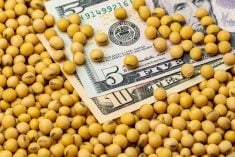Chicago | Reuters – U.S. lean hog futures retreated on Wednesday, surrendering nearly all of the prior session’s strong gains on worries about U.S. pork exports to China after a senior White House official said a “phase one” trade deal with the world’s top pork consumer could be delayed.
The delay followed news that Canada is set to resume pork exports to China following a four-month halt amid diplomatic tensions and a deal by China’s COFCO to buy $100 million of European pork.
The developments sparked worry that U.S. pork shipments, which have fallen short of market expectations so far this year, are not ramping up quickly enough to absorb excess supplies from an historically large U.S. hog herd.
Read Also

U.S. grains: Soy futures post biggest monthly gain in nearly five years on China trade optimism
U.S. soybean futures climbed to a 15-month high and posted their biggest monthly gain in nearly five years on Friday following a rally fueled by the prospect of revived exports to China.
A meeting between U.S. President Donald Trump and Chinese President Xi Jinping to sign a long-awaited interim trade deal could be delayed until December as discussions continue over terms and venue, a senior official of the Trump administration told Reuters on Wednesday.
Trump and Xi had been expected to meet at the Asia-Pacific Economic Cooperation (APEC) forum in Chile this month before that event was canceled.
“That would be a bearish factor if you were counting on exports picking up soon after the original APEC date in November,” said Alan Brugler, president of Brugler Marketing & Management.
Chicago Mercantile Exchange (CME) December lean hog futures tumbled 2.500 cents to 64.775 cents per pound. February futures fell 0.975 to 72.775 cents per pound.
Losses in deferred-month contracts were lessened by expectations that pork exports to China would eventually ramp up after the deadly hog disease African swine fever decimated its industry.
A report released by the U.S. pork industry on Wednesday forecast rising pork imports through 2022.
CME live cattle futures finished mostly lower in a profit-taking pullback following a steady price climb since early September and forecasts that feedlot cattle cash prices could slip this week.
CME December live cattle settled down 0.450 cent at 119.000 cents per pound while February futures closed at 124.700 cents per pound, up just 0.025 cent.
Feeder posted steeper declines, with actively traded January futures down 1.350 cents at 144.425 cents per pound.











